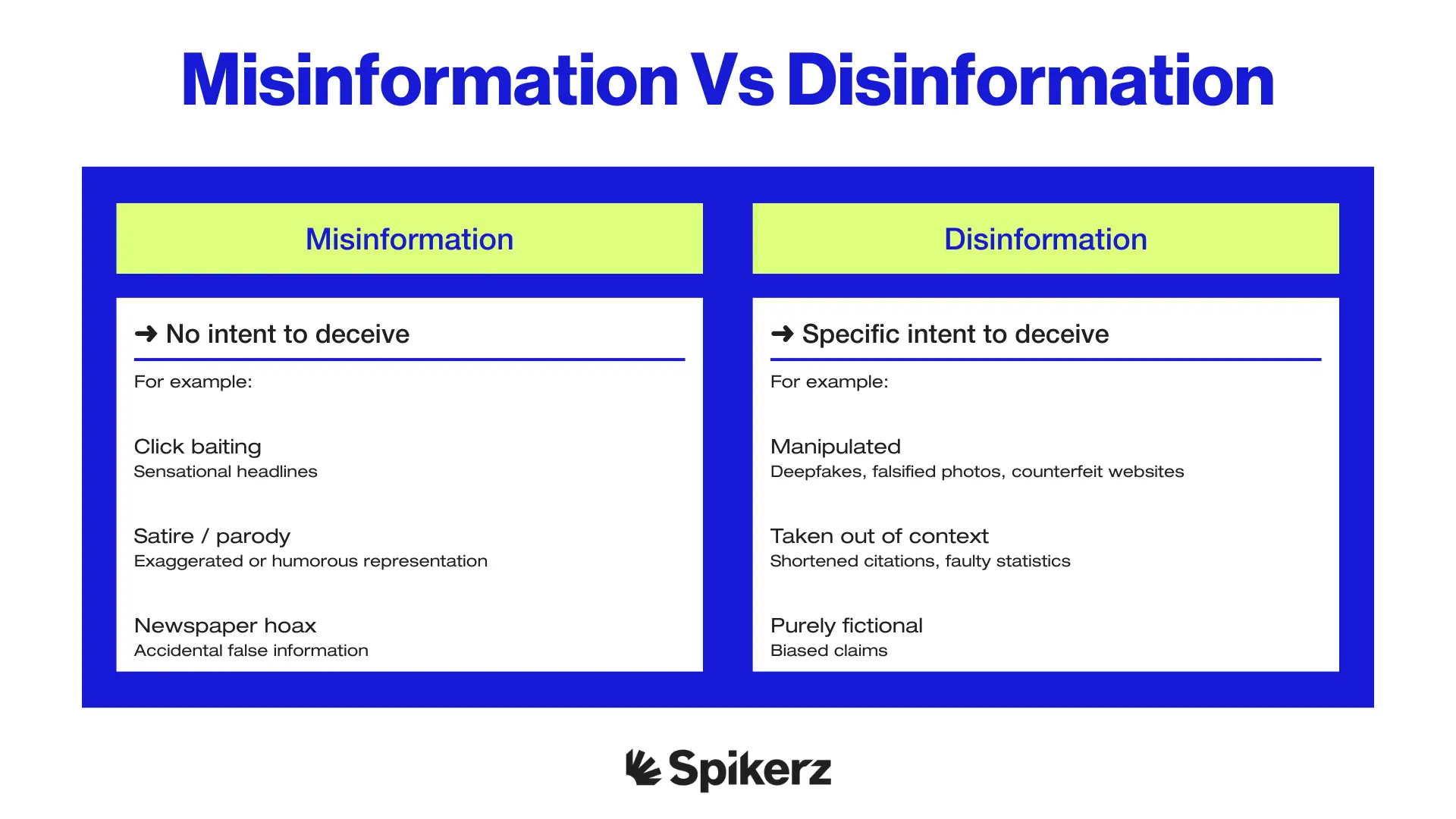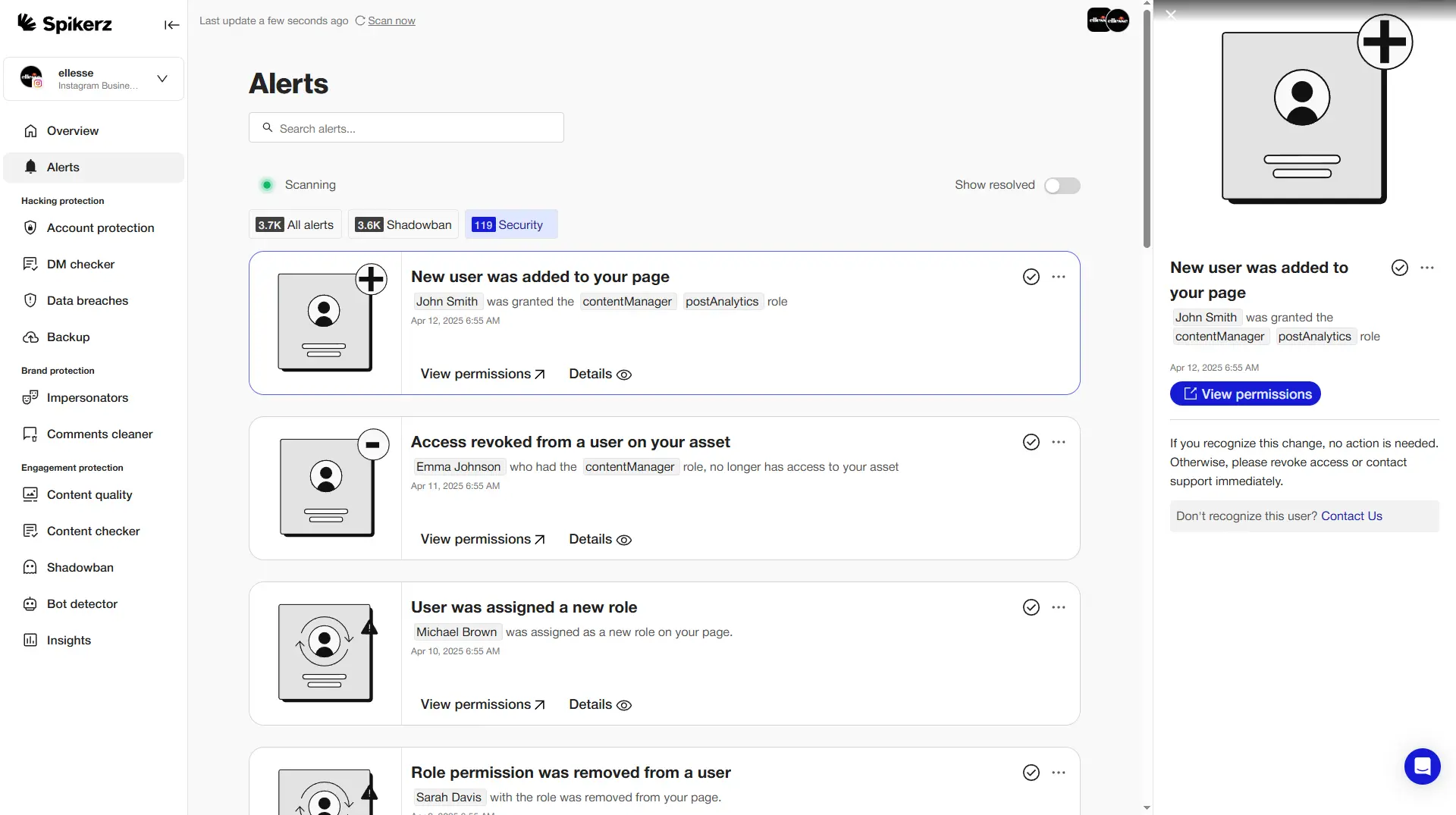What Is Disinformation Security? Why Does It Matter?
What Is Disinformation Security? Why Does It Matter?
Generative AI and viral media have given bad actors powerful new ways to create content that fuels disinformation campaigns. As a result, organizations worldwide are already feeling the effects and rushing to put defenses in place.
From deepfakes that impersonate executives to coordinated bot networks spreading false narratives, disinformation puts your brand reputation, financial stability, and customer trust at risk.
In this blog post, we'll explore what disinformation campaigns are, why bad actors deploy them against businesses, and how disinformation security can protect your organization from becoming the next victim of weaponized falsehoods.
What Are Disinformation Campaigns?
Disinformation campaigns are deliberate attempts to spread false information with the goal of deceiving people.
While they've become more visible and dangerous in recent years, they're not new. For centuries, political leaders and military powers have used disinformation as a strategy to influence opinion and gain an advantage. What has changed is the scale and the speed in which disinformation spreads today.
The technological advancement combined with social media has transformed these campaigns, making them faster, more targeted, and harder to recognize. And with countless outlets like websites, forums, streaming platforms, and cable channels, false information can circulate widely before it's ever questioned.

Unlike misinformation (which is false information shared unintentionally), disinformation is designed with intent. The goal is to mislead, manipulate, or spread confusion, and even though the motives are different, both can leave people equally misinformed.
That said, disinformation campaigns flourish in this environment because information now travels instantly and reaches massive audiences, making them one of the most important challenges in the modern online world.
Why Do Bad Actors Use Disinformation Campaigns?
Bad actors use disinformation campaigns against businesses and governments because it gives them power and influence without the need of traditional weapons or resources. When they spread false information, they damage reputations, disrupt operations, and weaken trust in institutions.
Also, some bad actors want to polarize audiences and stir up anger or confusion so that people turn against one another or lose confidence in their leaders.
Others focus on the financial aspect. They use disinformation to manipulate stock prices, trick employees into handing over sensitive data, or to open the door to cyberattacks.
Governments are frequent targets because disinformation can undermine public trust, interfere with elections, or fuel unrest that destabilizes entire societies. A clear example of this was The Doppelgänger campaign that was identified around 2022, which was a Russian disinformation operation that created fake versions of legitimate news websites to publish pro-Kremlin propaganda and anti-Ukraine narratives.
Businesses face similar risks. False narratives can drive away customers, impact market value, and leave organizations scrambling to defend themselves.
To achieve these goals, attackers rely on tactics like spreading fake news through social media, pushing out deepfakes, or using generative AI to produce misleading content at scale before organizations have a chance to respond. They also create convincing phishing messages and emails, exploit vulnerabilities in workplace systems, and even take over accounts to spread harmful messages directly.
The appeal of disinformation campaigns rests in how quickly they can spread, how hard they're to disprove, and how much disruption they cause with relatively little effort.
What Is Disinformation Security?
Disinformation security refers to the strategies and technologies that are created to detect, prevent, and limit the spread of false information online. It's an emerging field that's focused on countering disinformation threats and helping people and organizations know what they can trust.
Disinformation spreads quickly across social media platforms and digital channels, and for that reason, security in this area is just as important as traditional cybersecurity.
The main goals of disinformation security are to ensure accurate information, verify authenticity to prevent impersonation, and monitor harmful content, so it protects individuals and organizations from being misled or manipulated.
In practice, it combines advanced tools, monitoring systems, and verification methods to slow down the reach of false narratives and stop them from influencing audiences.
Areas Of Disinformation Security

Disinformation security covers many key areas that focus on detection, prevention, and protection.
One of the most important is deepfake detection, which uses generative AI and digital forensic technologies to separate real content from manipulated or artificial material to help audiences tell what's real and what isn't.
Another area is impersonation protection, which looks at behavior patterns to confirm whether actions and content come from legitimate sources; doing this helps prevent bad actors from acting as trusted individuals or organizations, which is a common tactic used.
Reputation protection is also a core part of disinformation security. It involves tracking the operations, influence, and infrastructure of attackers to stop them from damaging an organization's credibility.
Together, these areas work as a system to reduce the risk of being misled, manipulated, or harmed by disinformation.
Why is Disinformation Security So Important for Businesses?
Disinformation security is necessary because businesses rely on accurate, trustworthy information to make the right decisions. When false or manipulated data slips in, it can push leaders and employees toward choices that harm the organization instead of protecting it.
That’s exactly what disinformation campaigns are designed to do: Blur the line between fact and fiction. By making it harder to tell what’s real, they increase the risk of poor decision making that can ultimately damage both finances and reputation.
With that said, the growing presence of disinformation, misinformation, and deepfakes only raises the stakes. For example, recent findings show that 5% of businesses see these threats as an existential risk, while 14% believe they will drive significant operating costs and serious complications.
For 42%, the expectation is some added costs and disruptions, and only 28% feel the impact will be little or none. A small minority, just 3%, see potential new opportunities, while 7% doubt disinformation will rise at all.
This data show how many organizations are already bracing for the financial and operational weight of disinformation, which makes protective measures more than just a precaution.
One example of the real damage disinformation can cause is account takeovers. A type of attack that involves bad actors impersonating trusted users to spread false information or carry out scams.
Even though account takeovers made up just 2.4% of internet crime cases in 2023, they still resulted in $2.9 billion in losses for businesses, showing how even a relatively small slice of disinformation activity can lead to massive financial consequences.
What's The Best Way To Combat Disinformation Campaigns?
Disinformation campaigns have existed for thousands of years and they continue to exist because they work. But that doesn't mean there's nothing you can do about it.
There’s No Proven Method That Works In All Cases
Unfortunately, there's no proven method that works all the time. The reason is because disinformation spreads and resonates with people differently, which means the solutions need to be flexible and layered, instead of a one-size-fits-all. As a result, a mix of tools, strategies, and education is necessary in order to respond effectively.
In the long run, building resistance to disinformation is the most suitable defense. This involves what some call "information inoculation," which is where people develop the knowledge and skills to recognize false content and instinctively question what they see. As a result, they're far less likely to be misled or manipulated by false narratives.
Critical thinking and media literacy also play a big role in this process. Teaching people how to analyze information, check sources, and question motives strengthens their ability to separate truth from fabrication. Starting this education early, even in middle school, helps societies build long-term resilience.
Use A Social Media Security Tool To Protect Your Accounts
As we mentioned above, there's no proven method that works in every case to fight against disinformation campaigns, but there are tools and strategies that can help protect you from them. These tools are designed to spot disinformation tactics, reduce their impact, and keep accounts safe from being exploited.
One of the common methods bad actors use to carry out disinformation campaigns is account takeover, which is where they impersonate trusted users to spread false narratives or launch scams. Preventing this from happening is essential, and social media security tools play an important role because they analyze comments and messages for phishing attempts and other deceptive tactics.

Spikerz is a strong example of how these tools work in practice. Every login attempt is monitored to detect and block unauthorized access, instantly changing your password before a hack can even start.
The platform also monitors suspicious behavior, filters out malicious content, and shields your comment section from unwanted comments.
In addition, Spikerz helps protect businesses and individuals from bots, phishing, and other forms of social engineering attacks like impersonation, where attackers try to trick your followers into engaging with fraudulent content. It identifies imposters, monitors their activity, and takes steps to remove them from social media so your audiences only interact with your authentic accounts.
If protecting your brand from disinformation campaigns sounds like something you need, give Spikerz a try. We've helped thousands of businesses secure their social media presence from bad actors who spread false narratives. Your reputation deserves the same protection.
Conclusion
Disinformation security has become a business necessity in an era where false information spreads faster than truth. These campaigns exploit the speed and reach of digital platforms to damage reputations, manipulate markets, and undermine trust, all with minimal effort from attackers.
While no single solution can eliminate disinformation entirely, a layered defense combining education, critical thinking, and specialized security tools provides your best protection. If you understand how these campaigns work and implement proactive measures, it will transform your organization from an easy target into a hardened defense against weaponized falsehoods.
The truth is, the battle against disinformation won't end soon. But with the right strategies and tools like Spikerz protecting your social media accounts, you can ensure your business stays on the side of truth and keeps your reputation intact when false narratives strike.



